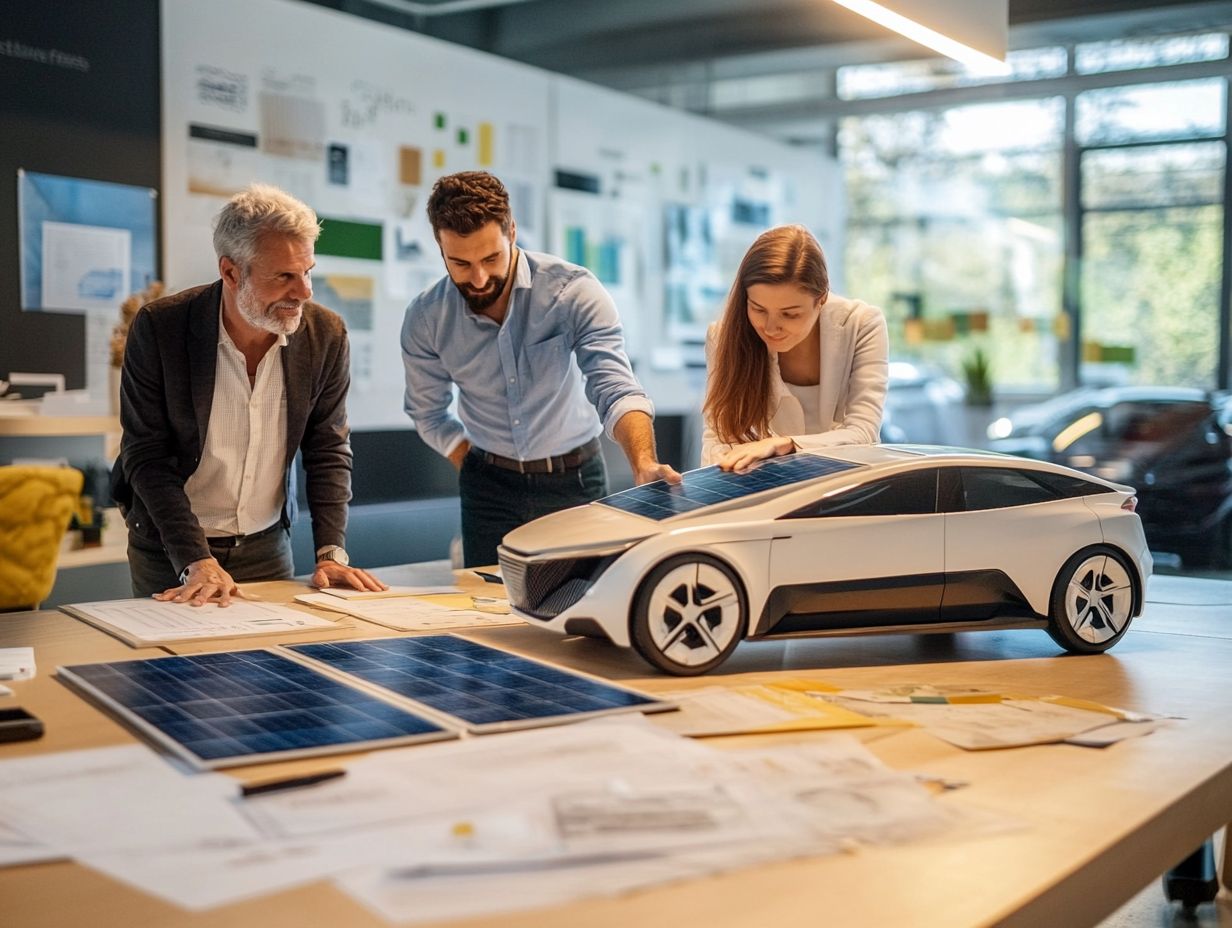Exploring the Future of Sustainable Car Financing
Are you ready to rethink how you finance your next car? Join the movement toward sustainable financing!
As the automotive industry undergoes transformation, the methods by which individuals finance their vehicles are also evolving. Traditional car financing models are increasingly under scrutiny for their economic implications and environmental impact.
With rising awareness of sustainability, it s essential to rethink your approach to car financing. This article delves into innovative and eco-friendly financing options, including green financing and shared ownership models. It also examines the challenges and opportunities that lie ahead.
Embrace this journey towards a more sustainable future in car financing.
Contents
- Key Takeaways:
- The Current State of Car Financing
- The Need for Sustainable Car Financing
- Innovative Approaches to Sustainable Car Financing
- Challenges and Opportunities for Sustainable Car Financing
- The Future of Sustainable Car Financing
- Frequently Asked Questions
- 1. What is sustainable car financing?
- 2. How does sustainable car financing benefit the environment?
- 3. Will sustainable car financing be more expensive than traditional car financing?
- 4. What types of vehicles are considered sustainable for car financing?
- 5. How can I find out if a car financing option is truly sustainable?
- 6. Are there any government incentives for sustainable car financing?
Key Takeaways:

The Current State of Car Financing
The current landscape of car financing reveals a significant shift aimed at accommodating electric vehicles (EVs) and sustainable transportation options. This change is driven by an increasing public awareness of climate change and the urgent need to reduce reliance on fossil fuels.
Traditional financing models typically favor gasoline cars, but innovative approaches are now emerging to align with the UK government’s emissions regulations. These approaches encourage greener choices among consumers like you.
The introduction of government incentives for electric vehicles is reshaping the financial landscape. This encourages you to seek out eco-friendly alternatives in light of rising fuel efficiency standards.
Traditional Car Financing Models
Traditional car financing models largely focus on gasoline cars. They leave little room for electric or hybrid alternatives, even as emissions regulations tighten and consumer awareness grows.
This bias toward petrol and diesel cars is evident in various financial products that favor traditional vehicle ownership with lower interest rates and better resale values. The infrastructure and support provided by financing companies are typically tailored to these vehicles, making it cumbersome for you if you re interested in electric options.
Government incentives like tax rebates for electric vehicle purchases aim to shift this paradigm. However, financial institutions often struggle to adapt, resulting in a disjointed experience for consumers.
Recent studies show that while electric vehicle sales surged by over 40% last year, traditional financing still dominates, accounting for more than 80% of automobile loans. This highlights the urgent need for financial models that embrace the shift toward sustainability.
The Impact of Car Financing on the Environment
The impact of car financing on the environment is substantial. Traditional financing models often favor gasoline cars, increasing emissions and hampering the transition to sustainable transportation.
In contrast, financing options specifically designed for electric and hybrid vehicles can be pivotal in addressing these environmental challenges. By prioritizing loans and incentives for eco-friendly choices, you re enabled to make decisions that significantly reduce carbon dioxide emissions.
This shift brings you personal benefits, like lower fuel and maintenance costs, while enhancing the automotive industry’s move toward greener practices. As more financing institutions recognize the significance of environmentally responsible options, they can help create a marketplace that fosters innovation in sustainable technologies, ultimately contributing to a cleaner planet for everyone.
The Need for Sustainable Car Financing
The urgency for sustainable car financing is becoming more pronounced as climate change and environmental crises tied to traditional internal combustion engine vehicles escalate.
As awareness around the benefits of electric vehicles (EVs) and hybrids deepens, you ll find that innovative financing solutions are essential to ease this transition.
These solutions make it easier for you to adopt eco-friendly vehicles.
Government incentives are important for making these eco-friendly options more accessible to you. They foster a shift towards sustainable car financing strategies that align with a greener future.
Environmental and Social Considerations

Environmental and social considerations are at the forefront of your journey towards sustainable car financing. This underscores the need to prioritize electric vehicles and eco-friendly transportation options as a means to combat climate change.
This shift not only addresses the urgent need to reduce greenhouse gas emissions but also fosters social equity and community well-being.
By making electric vehicles more accessible through innovative financing solutions, you can contribute to improved air quality and lower health risks associated with pollution in your community.
The ripple effects are significant. When you embrace sustainable transportation, you play a vital role in a collective effort that promotes healthier living environments, encourages public investment in green infrastructure, and enables local economies to flourish.
Therefore, car financing can become a powerful tool for reshaping societal norms and steering us all toward a greener future.
Innovative Approaches to Sustainable Car Financing
You ll find that innovative approaches to sustainable car financing are becoming essential in tackling the challenges posed by traditional financing methods.
These fresh solutions are particularly effective in promoting the adoption of electric vehicles and improving the charging infrastructure.
Green Financing Options
Green financing options are tailored specifically for you. They are designed to support sustainable car purchases and make electric vehicles more accessible through attractive government incentives and cost-efficient solutions.
These financing avenues often feature low-interest loans catered to eco-conscious buyers like you, along with state and federal tax credits that can significantly cut down the upfront cost of acquiring an electric vehicle.
Various financial institutions offer green credit cards and leasing programs that help lower overall expenses while encouraging environmentally friendly choices.
You might even find utility companies providing rebates for the installation of charging stations, further enhancing the allure of electric vehicles.
Take advantage of these green financing opportunities! Not only will you save money, but you ll also help create a cleaner planet, enjoying the benefits of modern sustainable transportation.
Shared ownership and leasing models represent a transformative approach to sustainable transportation. They allow you to access electric vehicles without shouldering the full financial burden of ownership.
By reducing those daunting upfront costs and offering more flexible payment structures, these models make it feasible for you to participate in environmentally friendly practices.
This accessibility encourages a shift in your consumer behavior, prompting you to consider electric and hybrid options over traditional gasoline-powered vehicles.
As a result, communities can experience a significant decrease in emissions, contributing to a healthier planet.
By sharing resources instead of placing long-term commitments on your shoulders, these alternatives foster a culture of collaboration and sustainability that resonates with today s eco-conscious mindset.
Challenges and Opportunities for Sustainable Car Financing
The challenges and opportunities surrounding sustainable car financing are intricate. They highlight the necessity for a comprehensive charging infrastructure and the strategic execution of government incentives to effectively promote electric vehicles.
Potential Obstacles and Solutions

Regarding sustainable car financing, you may encounter potential obstacles like inadequate charging infrastructure (places where electric vehicles can be charged) and a general lack of awareness. However, viable solutions are within reach government incentives and educational campaigns can effectively bridge these gaps.
The lack of charging stations often makes you think twice. This leads to misconceptions about the convenience of owning an electric vehicle. In fact, a recent study reveals that nearly 60% of prospective buyers see charging accessibility as a major concern. To tackle this issue, policymakers might consider implementing tax credits for the installation of charging points, especially in urban areas where they are desperately needed.
Incorporating sustainability into finance courses at universities can significantly enhance your understanding of the benefits of electric vehicles, enabling you to make more informed choices. Collaborative efforts between automotive companies and local governments can also ramp up awareness campaigns, ultimately boosting public interest in green options.
The Future of Sustainable Car Financing
The future of sustainable car financing looks incredibly promising for you, propelled by emerging trends in electric vehicles and significant advancements in battery technology. To stay informed on the future of car financing, it’s essential to be aware of the growing awareness of the impacts of climate change.
This changing landscape offers exciting opportunities for those looking to invest in greener transportation options.
Trends and Predictions
Trends and predictions in sustainable car financing indicate that you’ll likely see an increasing prevalence of electric and hybrid vehicles, fueled by government incentives and your growing demand for green options.
As you become more conscious of your carbon footprint, you’re not just thinking about your preferences; you’re actively searching for financing solutions that resonate with your values. This shift shows an exciting commitment to sustainability!
Financing institutions are keenly aware of this change, responding with targeted loans and leasing options specifically designed for buyers like you who are interested in electric and hybrid cars. With advancements in battery technology and charging infrastructure, the appeal of these vehicles is set to rise even further.
Industry experts anticipate that this momentum will persist, as both automakers and consumers align their objectives with a commitment to environmental stewardship, ultimately paving the way for a greener automotive future. Act now to be part of the greener automotive future!
Frequently Asked Questions
1. What is sustainable car financing?
Sustainable car financing is providing loans for eco-friendly vehicles, such as electric or hybrid cars, to support the growth of sustainable transportation options.
2. How does sustainable car financing benefit the environment?

By promoting the purchase of eco-friendly vehicles, sustainable car financing helps reduce the environmental impact of transportation, such as air pollution and greenhouse gas emissions.
3. Will sustainable car financing be more expensive than traditional car financing?
Not necessarily. While some sustainable cars may have a higher upfront cost, they often have lower operating and maintenance costs, making them a more affordable long-term option.
4. What types of vehicles are considered sustainable for car financing?
Typically, sustainable car financing is available for electric, hybrid, and alternative fuel vehicles. Some programs may also include incentives for fuel-efficient traditional cars.
5. How can I find out if a car financing option is truly sustainable?
Many banks and financial institutions offer sustainable car financing options that adhere to strict environmental standards. You can also research the environmental impact and efficiency of the vehicle you are considering purchasing.
6. Are there any government incentives for sustainable car financing?
Yes! Many countries and states offer tax credits or rebates for buying green cars.
This makes sustainable car financing more affordable and attractive.






